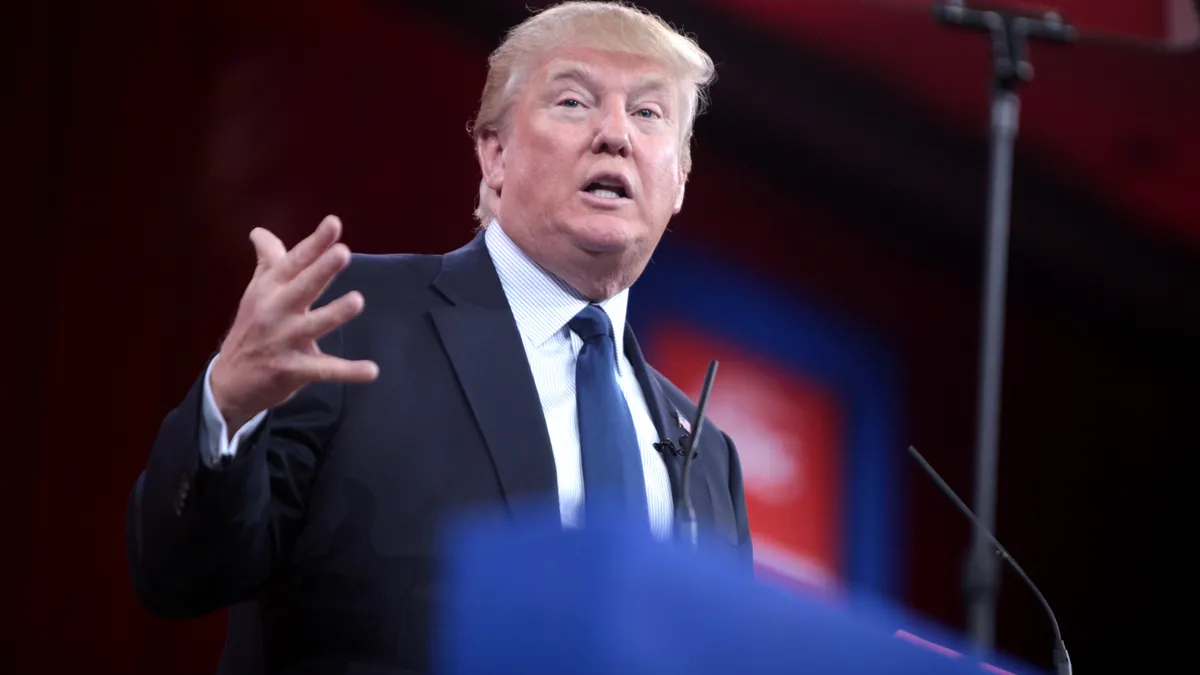Dive Brief:
-
President Donald Trump said in twin tweets Friday he would call on the U.S. Department of the Treasury to examine the tax-exempt status of nonprofit colleges. But it is likely an empty threat, legal experts say.
-
Trump accused institutions, without any evidence, of indoctrinating students into radically left policies rather than educating them.
-
His statements come as the White House presses state lawmakers, as well as the leaders of K-12 schools and colleges, to reopen campuses this fall.
Dive Insight:
In his tweets, Trump did not explicitly link his comments to his pressure campaign on institutions to resume normal operations in the coming academic year.
However, he spent last week aggressively pushing K-12 schools and colleges to reopen in the fall. The administration announced a new policy July 6 that bars international students from remaining in the U.S. if they enroll in purely online programs this fall. The rule, as well as his warning concerning colleges' tax exemptions, were widely viewed as ways to prod administrators into resuming in-person instruction.
Tax experts told Education Dive they were highly skeptical as to whether Trump's tweets would set off a review.
A vast majority of colleges are classified as nonprofits because they are affiliated with states or because of their educational mission.
Nonprofits are legally allowed to share and publicly advocate certain views, and they can engage in a limited amount of lobbying, said Lloyd Mayer, a law professor at the University of Notre Dame. What they cannot do, as Trump identified in one of his tweets, is teach "propaganda," Mayer said.
The IRS would only revoke the tax-exempt status of an educational entity that was espousing blatantly incorrect information, Mayer said, and colleges haven't come close.
"If you had a flat-Earth society, it would be a reason not to give a tax exemption," Mayer said. "But it would take something that extreme."
U.S. presidents also cannot demand a tax audit of a particular organization, said Brian Galle, a law professor at Georgetown University.
Galle said he believed the tweets were meant to force institutions to reopen but didn't carry any weight.
"It's just a blowhard making noise," he said.
The issue of tax exemptions for politically bent groups arose during a scandal in the Obama administration. In 2013, a government watchdog found the IRS delayed and scrutinized the applications of conservative groups seeking tax-exempt status, which led to a legal settlement with some of those organizations. A report four years later unearthed that the IRS also focused on groups that included liberal-sounding keywords in their applications.
Since the controversy, appropriations bills through Congress have included a prohibition on tax-exempt individuals or organizations being targeted based on their beliefs, Mayer said, noting that House Democrats also included the language in the current appropriations proposal.
However, Mayer said he feared that federal officials would view Trump's tweets as marching orders to find a legally sound way of auditing colleges, which would be expensive and unnecessary for institutions.
Trump has previously threatened to revoke colleges' federal funding for allegedly suppressing conservative views. Notably, in 2017, he called out the University of California, Berkeley, on Twitter, alleging it was blocking free speech on campus.
At the time, riots had broken out on campus against a planned speech by former Breitbart writer and editor Milo Yiannopoulos. While Trump accused UC Berkeley of not allowing Yiannopoulos to speak, it was the protests that forced the university to call off his address to campus.











